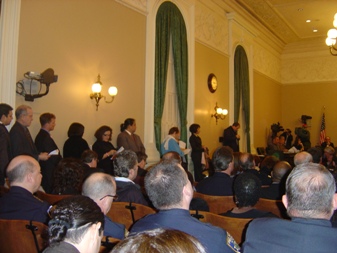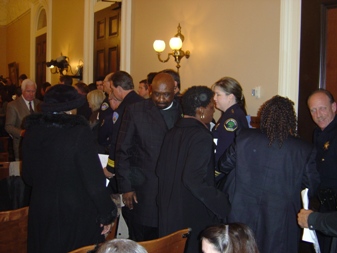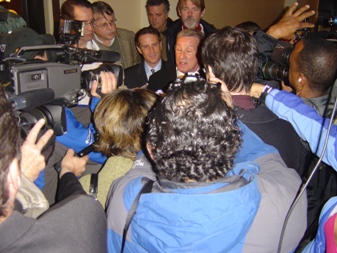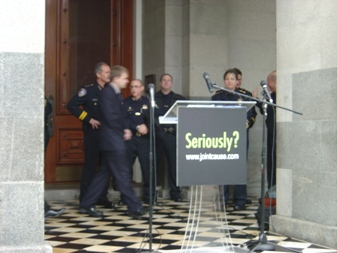Latest
New York Post Can't Write About Marijuana Without Laughing
NJ 'joint' vote to legalize medical pot
By ED ROBINSON and MAGGIE HABERMAN
New Jersey moved to the brink of legalizing medical marijuana last night when both houses of the state Legislature voted that it's high time to make the move. [New York Post]
Get it? 'Joint' vote? 'High' time? You're lucky if you saw this story first in the New York Post, because none of the other papers covered yesterday's developments with such irreverence. For example, check out NYT's boring coverage, which completely fails to find any humor in the situation and focuses instead on the seriously ill patients who will soon have legal access to their medicine.
Ed and Maggie were so busy dreaming up clever puns that they got a little sloppy with the facts:
The weed would be doled out by authorized state suppliers under the bill, which would make the Garden State the 14th to allow purchase of pot for medical reasons -- though the home-grown type would still be outlawed.
Actually, most of those states don't permit medical marijuana sales, and it's typical that the reporters who work hardest to make jokes about marijuana policy also have the toughest time getting the details right. Fortunately, New Jersey's lawmakers, as well as the American people and even the White House have come to understand that there's nothing the least bit funny about ending the arrest of seriously ill patients who rely on marijuana for medical treatment.
Whether you're the New York Post, or even the President of the New Jersey Senate, if you think anyone's looking for laughs in the medical marijuana debate, the joke's on you.
In US First, California Assembly Committee Approves Marijuana Legalization Bill
 |
|
 |
|
 |
|
Stephen Gutwillig and Aaron Smith in background |
 |
|
Early Bird SSDP Conference Registration Is Now Open!
Take part in something historic...
|
Dear friends,
It's here. And you won't want to miss it.
This March, we invite you to join hundreds of students, alumni, and drug policy reform advocates from around the world in creating a society that embraces sensible drug policy. We invite you to bridge political divides, reconnect with lost friends and alumni, and magnify the diversity of our advocacy network.
We invite you to join us for...
This Is Your Brain On Drug Policy:
SSDP'S 11th Annual International Conference
March 12-14, 2010
The Fort Mason Center, San Francisco, CA
Joining us in San Francisco this March 12-14Â will help to continue the incredible momentum that the drug policy reform movement has gained in 2009 and send the strong message that young people will not sit back as this war is waged in our names. We hope this will be the largest gathering of SSDP members in the history of the organization.
Don't miss the early bird registration discount! Register before Saturday, January 16 and save $10 off your registration cost!
We have 3 types of early bird registration:Â
Students: $90
SSDP Chapter members can receive a $40 discount by filling out this survey.
Alumni: $140
Non-Students: $190
We are so excited to have you join us at San Francisco's historic Fort Mason Center for this event. This is the first drug policy reform conference where you will be learning about activism and policy in classrooms with views of Alcatraz Prison, a place that once housed one of the most notorious criminals ever created by prohibition, Al Capone.
This event promises to unite SSDP chapter members, alumni, and others and help us move forward with our progress. You will leave this event with hundreds of new friends and allies and the inspiration to bring change back to your community.
So why wait? Secure your seat at the conference now, and get those plane tickets while they're still inexpensive. Visit http://www.ssdp.org/conference
We can't wait to see you there!
Jon, Micah, Amber, Stacia, Morgan, and Matt
SSDP's National Staff
P.S. If you are a student who is committed to drug policy reform but you are unable to afford the trip, there are scholarships available to help pay for travel and lodging. Apply now. http://www.ssdp.org/conference
If We're Gonna Incarcerate Millions of People, We Should Do More to Stop Prison Rape
 For a nation that leads the world in putting people behind bars, we're doing an absolutely horrible job of looking after the poor folks we keep tossing in there:
The Justice Department reported Thursday that 12 percent of incarcerated juveniles, or more than 3,200 young people, had been raped or sexually abused in the past year by fellow inmates or prison staff, quantifying for the first time a problem that has long troubled lawmakers and human rights advocates. [Washington Post]
So often, "protecting the children" is the knee-jerk justification for all sorts of draconian criminal justice policies. Yet, the youth who need the most help are routinely being sexually assaulted by the people who're supposed to be rehabilitating them.
The shameful â though not at all surprising â explanation for this seems to be that we just can't afford to do a better job than this:
Four former commissioners on a blue-ribbon prison rape panel that spent years studying the issue say they fear that authorities are deferring to concerns by corrections officials that reforms would cost too much, while not focusing enough on prison safety and the effects of abuse on inmates. Â
We can afford to put them in prison, but we just can't afford to take very good care of them. That is literally what's happening here, and it illustrates perfectly what an unfathomable travesty our criminal justice system has become. Yet, lawmakers continue to cower before the mighty prison lobbies that fight tirelessly to build more and more prisons that are less and less safe.
It's amazing that drug policy and criminal justice reform could be considered even remotely controversial while our correctional institutions remain plagued by endemic patterns of violence and sexual abuse. This would be intolerable even if everyone ever sentenced to prison in America actually deserved to be there (imagine that).
It's not enough to just wish it wasn't like this. The bottom line is that anyone who lobbies for aggressive police tactics and harsh laws bears responsibility for the abuse and indignation that innocent (and guilty, though undeserving) people will inevitably suffer within our brutal prison system. If you understand what happens in there, then you have a moral obligation to consider that reality when forming and expressing opinions about who truly belongs behind those bars.
Botched Drug Raid Death Leads to $2.5 Million Settlement
LIMA, Ohio â The insurance carrier for the City of Lima has agreed to pay $2.5 million to the family of a woman who was shot and killed by a city police sergeant in January, 2008.
â¦
Wilson, 26, a biracial woman, was shot to death by Sgt. Joseph Chavalia, who is white, during a drug raid at her south side home. Wilson's 1-year-old son, Sincere, was injured in the gunfire.
The incident led to allegations by some in the African-American community in Lima who charged that the city's mostly white police department targeted blacks. [Toledo Blade]
And it led to a lot of accusations from drug policy reformers that police shoot way too many innocent people in overly-aggressive drug raids. You may recall that this was the case in which the officer claimed that he opened fire on Tarika because he was startled by gunshots downstairs. Those shots were fired by his own fellow officers as they killed the family's dogs. Tarika Wilson literally lost her life because a cop was freaked out by gunfire from another cop. Oh, and her baby daughter also got shot.
Radley Balko has much more.
New Jersey Legislature Passes Medical Marijuana Bill, Set to Become 14th Medical Marijuana State (Plus DC)
New Jersey Assembly Approves Medical Marijuana Bill, One More Vote in the Senate This Afternoon
It's Time to Legalize Medical Marijuana in Professional Sports
Harvin was a controversial draft pick after he tested positive for marijuana use at the February scouting combine. But as it turned out, the biggest problem he encountered was an intensification of migraine headaches that has plagued him for much of his life.
Oh, I think I know what's going on here. First, Harvin gets in trouble for testing positive for marijuana. Now he's passing drug tests, but suffering from constant debilitating migraines. Sounds like the NFL has simply prohibited him from using the one medicine that effectively treats his condition.
The thing about marijuana and migraines is that it doesn't just relieve symptoms, it often stops the headaches from ever happening in the first place. I've spoken with many migraine sufferers who've found that even modest use of marijuana simply makes the problem go away. I discovered this for myself in my late teens and it changed my life. I used to wake up everyday wondering if by mid-afternoon, I'd be huddled in a dark room, half-blind, violently nauseous and knowing I'd be unable to function again for 12 hours. It was horrible, but it ended quite abruptly one summer, and it was only later that I came to understand why.
So I can't even begin to describe my frustration at watching a world-class athlete's career jeopardized by the NFL's ridiculous prohibition against marijuana. Banning recreational use is silly, but this is an outrage. If you don't want publicity surrounding marijuana use in professional sports, then stop testing the athletes for marijuana. If that's too much to ask, then at least create an exemption for cases in which a doctor recommends medical use. Believe me, this would generate next to no controversy, although substantial coverage ranging from neutral to positive would be almost guaranteed.
If the President of the United States can embrace a more reasonable medical marijuana policy, there's no reason the NFL canât do the same.
Pagination
- First page
- Previous page
- …
- 494
- 495
- 496
- 497
- 498
- …
- Next page
- Last page

